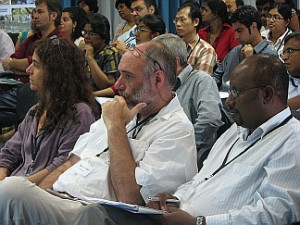Operating from headquarters in a leafy suburb of Colombo, Sri Lanka, IWMI was founded in 1985 as the International Irrigation Management Institute (IIMI). Over time, its experts realized that irrigation could be more effective if considered within the wider context of managing water resources, so it became the International Water Management Institute (IWMI). Today, in addition to its headquarters, IWMI has 12 offices located across Asia and Africa. On these continents, often affected by droughts and floods, effective water management can sometimes be the difference between life and death.
 In Asia, IWMI has regional offices in: Hyderabad and New Delhi (India); Lahore (Pakistan), Tashkent (Uzbekistan), Kathmandu (Nepal) and Vientiane (Laos). And in Africa, there are regional offices in Accra (Ghana), Pretoria (South Africa) and Addis Ababa (Ethiopia), along with a satellite operation in Ouagadougou (Burkina Faso). Asia and Africa have different requirements when it comes to managing water for agriculture, so the kind of work carried out varies across the different offices.
In Asia, IWMI has regional offices in: Hyderabad and New Delhi (India); Lahore (Pakistan), Tashkent (Uzbekistan), Kathmandu (Nepal) and Vientiane (Laos). And in Africa, there are regional offices in Accra (Ghana), Pretoria (South Africa) and Addis Ababa (Ethiopia), along with a satellite operation in Ouagadougou (Burkina Faso). Asia and Africa have different requirements when it comes to managing water for agriculture, so the kind of work carried out varies across the different offices.
Projects conducted by IWMI staff include: major cross-boundary efforts in Central Asia to ensure irrigation infrastructure installed by the Soviet Union continues to supply water equitably to farmers in the now independent countries of Uzbekistan, Tajikistan and Kyrgyzstan; schemes to help find appropriate ways for farmers in parched African countries to build small water stores to help them overcome dry spells and ensure their crops survive; and research into how best wetlands can be used to support agriculture in a way that maintains vital ecosystem services and healthy wildlife.

